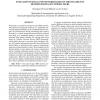Free Online Productivity Tools
i2Speak
i2Symbol
i2OCR
iTex2Img
iWeb2Print
iWeb2Shot
i2Type
iPdf2Split
iPdf2Merge
i2Bopomofo
i2Arabic
i2Style
i2Image
i2PDF
iLatex2Rtf
Sci2ools
123
click to vote
ICASSP
2009
IEEE
2009
IEEE
Evolution of social P2P networks based on the dynamics of heterogeneous multimedia peers
In this paper, we consider social peer-to-peer (P2P) networks, where peers are sharing their resources (i.e., multimedia content and upload bandwidth). In the considered P2P networks, peers are self-interested, thereby determining their resource divisions (i.e., actions) among their associated peers such that their utility (e.g., multimedia quality) is maximized. Peers determine their optimal strategies for selecting their action based on a Markov Decision Process (MDP) framework, which enables the peers to maximize their cumulative utilities. We consider heterogeneous peers that have different and limited ability to characterize their resource reciprocations using only a limited number of states. We investigate how the limited number of states impacts the resource reciprocation and the resulting multimedia quality over time. Simulation results show that peers simultaneously refining their state descriptions can improve the multimedia quality in the resource reciprocation. Moreover, p...
Related Content
| Added | 17 Aug 2010 |
| Updated | 17 Aug 2010 |
| Type | Conference |
| Year | 2009 |
| Where | ICASSP |
| Authors | Hyunggon Park, Mihaela van der Schaar |
Comments (0)

